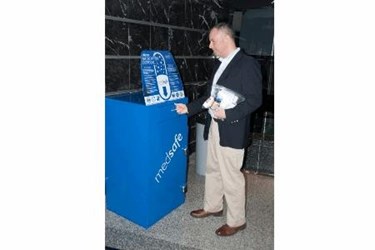New Drug Collection Boxes At MWRD Facilities Work To Protect Waterways And Encourage Safe Disposal

As a result of recent success at the Metropolitan Water Reclamation District of Greater Chicago's (MWRD's) Drug Take Back Day collections, the agency will permanently house drug drop-off boxes at four locations.
The 38-gallon Medsafe drug collection boxes will be housed at the MWRD's Main Office Building, at 100 E. Erie St. in Chicago from 9 a.m. to 6 p.m., Monday through Friday. The boxes will be open seven days a week from 9 a.m. to 6 p.m. at the MWRD's Stickney, Calumet and O'Brien water reclamation plants (WRPs). The Stickney WRP is located at 6001 W. Pershing Rd., Cicero; Calumet is at 400 E. 130th St., Chicago; and O'Brien is at 3500 Howard St., Skokie.
"We are happy to introduce these new drug collection sites that will prove to be extremely valuable in promoting safety practices for disposing medications and protecting our water," said MWRD President Mariyana Spyropoulos. "It is important not to dispose of medications down the drain because they end up in the waterways. Controlling what goes down the drain is the easiest and most effective way to protect our environment."
The new Medsafe boxes do not accept illegal drugs, liquid containers more than four ounces, sharps containers, needles, syringes, batteries, aerosol spray cans, trash, medical devices, chemicals or other hazardous materials. When making a deposit, users are urged to keep the medications in the original packaging and containers when possible and to place liquid containers inside plastic bags before depositing. The Medsafe boxes will be located near MWRD police to ensure proper authorities are present at drop-off. If a box is locked, users are asked to return during hours of operation and avoid leaving medication outside the box.
Between April 29 and 30, the MWRD collected 257 pounds of drugs for safe disposal as part of the U.S. Drug Enforcement Administration's (DEA) National Drug Take Back Day. The event, held at the three plants and headquarters downtown, provided a safe, convenient and responsible means for disposing prescription drugs, while also educating the general public about the potential for abuse of medications and potential harm to the environment. To prevent or reduce accidental contamination of streams, rivers and lakes, the MWRD has worked with the DEA Chicago Field Division to participate in the initiative each year since the event was launched in 2010. This latest collection eclipsed the last Drug Take Back Day in September 2015, when the MWRD collected 237 pounds of unwanted pharmaceuticals.
Drugs are often mistakenly deposited in toilets and drains and are destined for local waterways. Water treatment facilities are not designed to remove minute concentrations of pharmaceuticals, and the chemicals could eventually wind up in area streams and waterways and have a negative impact on water quality. Numerous studies show significant negative effects that pharmaceutical drugs have on aquatic life.
There are many ways to reduce the amount of pharmaceuticals before they reach treatment facilities and/or the waterways. The first is to complete the course of treatment as prescribed by the physician. For over-the-counter products, a supply should be monitored and stored in one location at home to prevent the purchase of additional or extras. Homeowners are encouraged never to pour the pharmaceuticals down the toilet or drain or give or sell them to others. Besides the MWRD boxes, there are various police stations and municipalities across Cook County that allow medicine to be deposited throughout the year. The city of Chicago also collects unwanted medicines 24 hours per day, seven days per week at its police facilities as well. For more information, visit www.mwrd.org.
About the Metropolitan Water Reclamation District of Greater Chicago
Established in 1889, the MWRD (www.mwrd.org) is an award-winning, special purpose government agency responsible for wastewater treatment and stormwater management in Cook County, Illinois.
Source: Metropolitan Water Reclamation District of Greater Chicago's (MWRD's)
